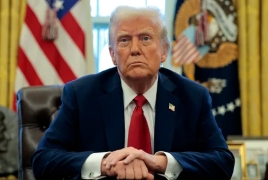
U.S. President Donald Trump reiterated his earlier claim that a decision on Iran would be made within two weeks, stating that this is the maximum timeline.
“Given the fact that there may or may not be significant negotiations with Iran soon, I will decide within the next two weeks whether to strike or not,” said Trump in a statement released by White House Press Secretary Karoline Leavitt, as reported by NBC News.
NBC News notes that over the past two months alone, Trump has referenced a “two-week” deadline more than ten times in various policy contexts—a pattern dating back to the early days of his presidency.
For example, on February 9, 2017, he claimed: “We’ll be revealing something—I’d say within two or three weeks—that will be amazing in terms of tax policy and aviation infrastructure.” However, Bloomberg later reported that only a single-page proposal was presented 11 weeks later.
Throughout his presidency, Trump repeatedly made similar pledges on healthcare and infrastructure, often citing the same timeline, without delivering on them. In recent weeks, he has expanded this approach to a range of issues, from trade deals and tariffs to the Russia-Ukraine conflict. Many of these announcements have remained unfulfilled and left key questions unanswered.
The White House declined to comment when contacted.
Trump also claimed that Europe cannot play a major role in resolving the Israel–Iran conflict.
He criticized National Intelligence Director Tulsi Gabbard for asserting that there is no evidence Iran is close to building nuclear weapons, according to The Jerusalem Post.
Speaking to reporters at Morristown Airport in New Jersey, Trump dismissed U.S. intelligence assessments.
“She’s wrong,” Trump said, referring to Gabbard’s March speech where she cited assessments that Iran is not expected to produce nuclear weapons in the near future.
A source familiar with U.S. intelligence reports told Reuters the assessments have not changed. U.S. agencies believe it would take Iran about three years to build and deploy a nuclear weapon, though some experts argue the country could construct and place a dummy weapon in less time.
Trump said he may support a ceasefire between Israel and Iran “depending on the conditions.”
He further expressed doubt that Europe could make a meaningful contribution to resolving the Israel-Iran conflict. “Iran doesn’t want to talk to Europe. They want to talk to us. Europe can’t help in this,” Trump said.
His remarks came as Iran’s foreign minister met European counterparts in Geneva to push for diplomatic progress on its nuclear program. Despite calls for cooperation with Washington, the discussions yielded little progress.
When asked if ground troops would be needed against Iran, Trump responded, “I won’t speak about ground troops because that’s the last thing you’d want.”
Trump and the White House confirmed that a decision would be made in the next two weeks on whether the U.S. will engage in war. Trump continues to alternate between advocating for rapid diplomatic solutions and suggesting Washington could side with Israel militarily.
Israel, the only Middle Eastern state believed to possess nuclear weapons, says its strikes aim to prevent Iran from developing such arms. Iran, a signatory to the Nuclear Non-Proliferation Treaty, insists its nuclear program is peaceful and has responded with missile attacks.
According to Iran’s human rights news agency, 639 people were killed by Israeli strikes. Israel reported 24 civilian deaths from Iranian attacks.

